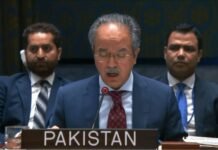Bern, 15 December 2021 (TDI): During an official ceremony which took place this afternoon, the Maldivian Ambassador to Switzerland, Asim Ahmed, presented his Letter of Credence to the President of the Swiss Confederation, Guy Bernard Parmelin. The meeting was held at the Federal Palace of Switzerland, located in Bern.
THE CEREMONY
Ambassador Ahmed extended greetings on behalf of the President of Maldives, Ibrahim Mohamed Solih, as well as the people of Maldives. These were targeted towards Swiss President Parmelin and the local people of Switzerland.
Meanwhile, President Parmelin expressed congratulations to the Maldivian Ambassador on his new appointment. He also expressed bright hopes for the future of bilateral relations between Maldives and Switzerland.

In addition to that, Ambassador Ahmed also communicated Maldives’ strong resolve to collaborate with the Swiss Government and enhance ties.
In particular, he expressed his own commitment to accelerating cooperation in multiple fields during the course of his ambassadorship. Ahmed stressed renewing focus on increasing bilateral and multilateral cooperation between both nations.
AMBASSADOR’S OTHER EXCHANGES
During his official visit to Bern, the Maldivian Ambassador also called upon Ambassador Raphael Nägeli. Nägeli is the Head of Division Asia and Pacific at the Federal Department for Foreign Affairs in Switzerland.
Both parties exchanged views on further boosting the traditionally close and friendly relations between the Maldives and Switzerland.
BRIEF OVERVIEW OF MALDIVES-SWITZERLAND RELATIONS
The Maldives first established diplomatic relations with Switzerland in 1981 after its independence from Britain in 1965. Both countries possess similar stances on global issues such as climate change.
Furthermore, both share strong economic ties which are heavily reliant on the tourism industry. Over 34,000 tourists from Switzerland visited the Maldives in 2013, according to the Maldives Tourism Board. This generated an income of approximately USD 48 million.
Despite a lack of frequent high-level exchanges, both countries have maintained bilateral contact through meetings within international bodies.
A 19-year-old with a fervour for writing, journalism and the humanities.








